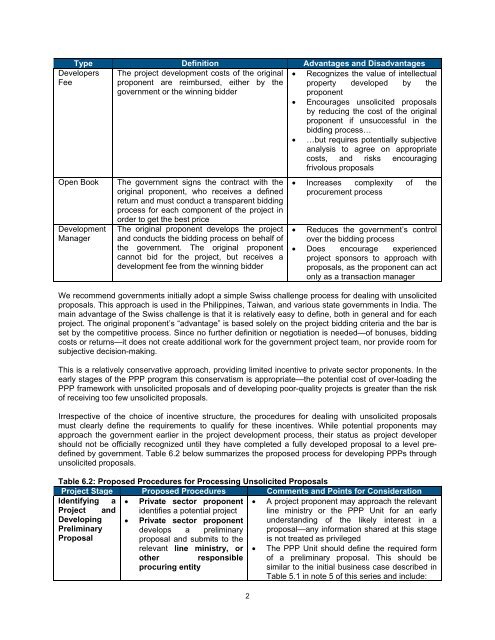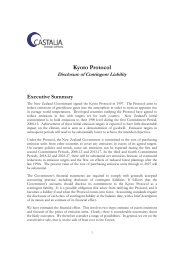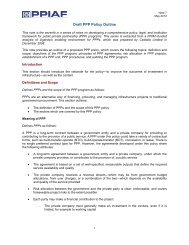Unsolicited proposals - ppiaf
Unsolicited proposals - ppiaf
Unsolicited proposals - ppiaf
Create successful ePaper yourself
Turn your PDF publications into a flip-book with our unique Google optimized e-Paper software.
Type Definition Advantages and Disadvantages<br />
Developers The project development costs of the original Recognizes the value of intellectual<br />
Fee<br />
proponent are reimbursed, either by the property developed by the<br />
government or the winning bidder<br />
proponent<br />
Encourages unsolicited <strong>proposals</strong><br />
by reducing the cost of the original<br />
proponent if unsuccessful in the<br />
bidding process…<br />
…but requires potentially subjective<br />
analysis to agree on appropriate<br />
costs, and risks encouraging<br />
frivolous <strong>proposals</strong><br />
Open Book<br />
Development<br />
Manager<br />
The government signs the contract with the<br />
original proponent, who receives a defined<br />
return and must conduct a transparent bidding<br />
process for each component of the project in<br />
order to get the best price<br />
The original proponent develops the project<br />
and conducts the bidding process on behalf of<br />
the government. The original proponent<br />
cannot bid for the project, but receives a<br />
development fee from the winning bidder<br />
2<br />
Increases complexity of the<br />
procurement process<br />
Reduces the government’s control<br />
over the bidding process<br />
Does encourage experienced<br />
project sponsors to approach with<br />
<strong>proposals</strong>, as the proponent can act<br />
only as a transaction manager<br />
We recommend governments initially adopt a simple Swiss challenge process for dealing with unsolicited<br />
<strong>proposals</strong>. This approach is used in the Philippines, Taiwan, and various state governments in India. The<br />
main advantage of the Swiss challenge is that it is relatively easy to define, both in general and for each<br />
project. The original proponent’s “advantage” is based solely on the project bidding criteria and the bar is<br />
set by the competitive process. Since no further definition or negotiation is needed—of bonuses, bidding<br />
costs or returns—it does not create additional work for the government project team, nor provide room for<br />
subjective decision-making.<br />
This is a relatively conservative approach, providing limited incentive to private sector proponents. In the<br />
early stages of the PPP program this conservatism is appropriate—the potential cost of over-loading the<br />
PPP framework with unsolicited <strong>proposals</strong> and of developing poor-quality projects is greater than the risk<br />
of receiving too few unsolicited <strong>proposals</strong>.<br />
Irrespective of the choice of incentive structure, the procedures for dealing with unsolicited <strong>proposals</strong><br />
must clearly define the requirements to qualify for these incentives. While potential proponents may<br />
approach the government earlier in the project development process, their status as project developer<br />
should not be officially recognized until they have completed a fully developed proposal to a level predefined<br />
by government. Table 6.2 below summarizes the proposed process for developing PPPs through<br />
unsolicited <strong>proposals</strong>.<br />
Table 6.2: Proposed Procedures for Processing <strong>Unsolicited</strong> Proposals<br />
Project Stage Proposed Procedures Comments and Points for Consideration<br />
Identifying a Private sector proponent A project proponent may approach the relevant<br />
Project and identifies a potential project line ministry or the PPP Unit for an early<br />
Developing Private sector proponent understanding of the likely interest in a<br />
Preliminary develops a preliminary proposal—any information shared at this stage<br />
Proposal<br />
proposal and submits to the is not treated as privileged<br />
relevant line ministry, or The PPP Unit should define the required form<br />
other responsible of a preliminary proposal. This should be<br />
procuring entity<br />
similar to the initial business case described in<br />
Table 5.1 in note 5 of this series and include:










